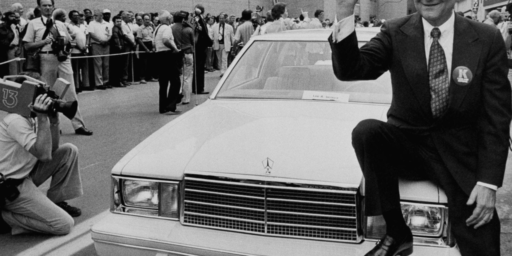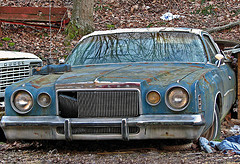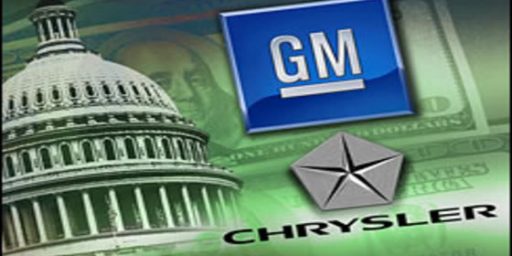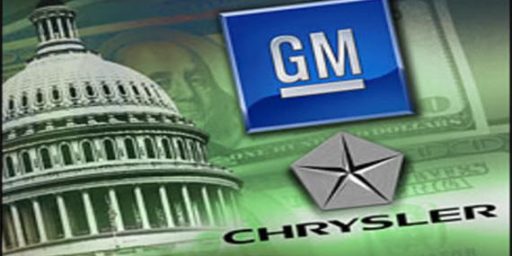Political Control of Government Motors
Back when talks about bailing out General Motors started one potential issue was that GM would “encouraged” to make decisions based on political considerations vs. a sound business plan. Looks like there is evidence for such concerns with this story of how Montana’s Congressional Representative and two Senators are pushing to get a contract reinstated with a Montana palladium mine.
Montana Rep. Denny Rehberg was no fan of the $58 billion federal rescue of General Motors Co., saying he worried taxpayer money would be wasted and the restructuring process would be vulnerable to “political pressure.” Now the lawmaker says it’s his “patriotic duty” to wade into GM’s affairs.
Along with Montana’s two Democratic senators, the Republican congressman is battling to get GM to reinstate a contract with a Montana palladium mine nullified in bankruptcy court. “The simple fact is, when GM took federal dollars, they lost some of their autonomy,” Mr. Rehberg says.
Translation: I might lose votes next election so whether reinstating this contract makes sound business sense or not, I’m going to use my influence to get in reinstated and screw the tax payers.
Federal support for companies such as GM, Chrysler Group LLC and Bank of America Corp. has come with baggage: Companies in hock to Washington now have the equivalent of 535 new board members — 100 U.S. senators and 435 House members.
Yes, and those 535 new board members don’t answer to shareholders, they answer to their constituents. Obviously these new board members are going to be making very good business decisions. Just look at the U.S. budget….uhhhmmm…look at Social Security….hmmm…Medicare, wait no don’t look! In fact, these aren’t the droids you are looking for either. Move along now.
Some more juicy bits from the article,
In May, even before the government’s ownership became official, lawmakers erupted when GM disclosed it planned to produce a new subcompact car at its factories in China. Under congressional pressure, GM dropped those plans and promised instead to retool an existing U.S. facility in Michigan, Wisconsin or Tennessee for the new model.
Lawmakers from those states demanded and received high-level meetings in Washington to quiz GM on the criteria for site selection and to tout their states. GM in the end picked a site in Michigan.
That same month, GM dealer Pete Lopez in Spencer, W.Va., received notice that GM was giving him just over a year to shut down his Chevy, Pontiac and Buick dealership, which he’d acquired two years earlier. GM’s move to shutter more than 1,300 dealerships — about one-quarter of its network — was central to its restructuring because it cleared out underperforming showrooms and brought the network more in line with its shrunken sales.
With an assist from his mayor, Mr. Lopez took his complaint straight to one of his state’s senators, Jay Rockefeller, the Democratic chairman of the powerful Commerce Committee.
Sen. Rockefeller sent a letter to GM headquarters on Mr. Lopez’s behalf, according to a staff aide. He arranged for Mr. Lopez to come testify before a Senate panel in early June, alongside GM Chief Executive Frederick “Fritz” Henderson. The senator introduced the two men, giving Mr. Lopez a chance to make a personal pitch.
[…]
In addition to the dealership issue, lawmakers have jumped into a union fight that pits GM and Chrysler against two trucking companies that haul new cars around the country. The auto makers want to give some of the work to cheaper nonunion contractors. But that raised the ire of lawmakers who support the International Brotherhood of Teamsters.
Rep. Dale Kildee, a Democrat from Michigan, sent letters on Sept. 30 to the chief executives of both GM and Chrysler, demanding they explain their positions and advising them to stick with their unionized carriers. At least four other lawmakers sent similar letters.
[…]
GM for years was supplied by the Montana-based Stillwater Mining Co., which bills itself as the country’s only supplier of the precious metal. In early July, Frank McAllister, the mine’s chief executive, received news that GM, as part of its bankruptcy proceedings, planned to sever its ties with Stillwater in favor of cheaper suppliers in Russia or South Africa.
“I thought, for heaven’s sake, this doesn’t make any sense,” says Mr. McAllister. “Taxpayer dollars are keeping GM alive, just so it can turn away from U.S. workers?”
[…]
“I was elected to represent the interests of Montana, not General Motors, which is something that GM should have considered before letting the federal government assume control of their company,” Rep. Rehberg said recently.
Government Motors the new welfare program of the Obama Administration.






If they cannot be driven out of business by excessive labor costs and poor market decisions, maybe they will fail because the American people will not buy their product. After all, the UAW members are not able to purchase enough cars to support that which they have ruined.
UAW is the real kicker here. Organized labor received one of the biggest election payoffs here when the UAW got a lot of something for nothing. Now the one profitable US auto company has to negotiate labor contracts with the part owners of its rivals. What could possibly be wrong with that.
Very provocative article.
I supported, with trepidation, this bailout because the alternative of even bigger problems if GM went BK.
This article highlights the inherent problems concomitant with politics mixing with private sector economic decision making.
So what is the solution?
Perhaps there isn’t a silver bullet. But I am sure there will be a harangue against government interference in the market bla bla.
I’m not suggesting anything, but has Rep. Rehberg received campaign contributions from Ford or from Hyundai dealerships? Just wondering.
In other news, 1/3 of our 2010 corn crop is expected to go to government subsidized ethanol conversion.
Free markets indeed. There is a lot to unwind here.
(Note that GM did a lot of television advertising for the ethanol “solution” last year.)
There was an intersting story about the politics of the Chyrsler bailout:
This is a fundamental flaw with representative democracy, elected officials damaging the country as a whole in order to protect their constituents. Until incentives change we will continue to see this. Term limits would be a step in the right direction.
I wonder how this flaw will manifest itself if the government takes over health care? Actually, I don’t wonder at all.
Yes, and lets not ignore that removing these subsidies could reduce third world poverty and also improve the environment.
Yay big government and technocrats like Obama!
Yet another argument for smaller government. Or as Lord Acton noted long ago, power corrupts, absolute power corrupts absolutely.
Well, isn’t it an illustration of a more deeply ingrained (<- accidental pun) problem? Ethanol mandates and subsidies have been growing for about 30 years.
In fact, Obama himself hasn't expanded "Bush's" subsidies, has he?
please rescue my comment from the spam filter
I’m confused.
Politicians never used to lobby corporations to keep business flowing to their districts? That’s only come about because of the bail-out?
Aren’t a good many car factories in their current locations precisely because of the interference of politicians who offer them tax breaks, new infrastructure and a better shot at future government business?
And we’re worried that Congress might not make sound business decisions? About General Motors? A company that hasn’t made a sound business decision since they put fins on a Cadillac?
GM was inches away from annihilation. So even if we grant the unproven notion that government types will interfere, just exactly what could government interference do to GM that GM hasn’t already done to itself?
You can certainly argue that we should have let GM go under. But it’s kind of silly to argue that GM is being interfered with by those cursed politicians. Like complaining that the emergency room doctor shocked you.
I believe you meant your cheers for Bob Dole and Chuck Grassley and a lot of other conservative heartland Republicans and Blue Dog Dems. Pretty sure they were setting up the ethanol boondoggle while Mr. Obama was still in short pants.
Michael,
You are describing rent seeking, which is somewhat different from what my post is describing. Further, both rent seeking and what we are seeing here with GM are bad.
Are you really arguing, that since rent seeking is bad, its just fine to have politicians making decisions based on politics where tens of billions in taxpayer money is at risk?
Google is your friend.
But to be fair, I don’t see this as a partisan issue. I see both the “Democrats and Republicans as wings of the same predatory state”.
Charles –
You have an audio comment at “Efficient Markets”
Well, to begin with, politicians making decisions based on politics where tens of billions in taxpayer money is at risk is pretty much the job description of all politicians.
What I’m arguing is that the sky isn’t falling just because pols are trying to do just what they’ve always tried to do. In fact, what they’ve done successfully for at least as long as I’ve been alive: use every available lever to tilt elections their way.
And I’m arguing that it’s comical to talk about bad decisions in the context of a company that gave us the Aztek and the Hummer.
The point on ethanol was that it makes no sense to point a finger at Obama since almost every presidential candidate of either party (at least those who run in the Iowa caucuses) kneels at the altar of ADM, along with every Congressperson from every corn-growing state, again regardless of party. A large number of those are politicians who oppose “big government.” Or claim to.
Guess that means the boss man is flying jets again
Verdon is just making the point (ad nauseum to some) that this is the predictable result of anything where the government gets too big and powerful.
I think we can all agree that Chrysler and GM were going into bankruptcy. From a political point of view, whether to resurrect them was a battle between two groups: those politicians whose constituents who would be badly hurt by their liquidation (big supplier chains including our friends in Montana), and those politicians who had already blown their billion dollar tax breaks on foreign competitors. One of them won, but neither of them really feel like doing anything about companies who are quote unquote too big to fail.
Yeah, I know Steve’s point: government = bad, free market = good, and if people can’t afford health insurance there are always the prisons and the workhouses. I was a Libertarian myself at one point. Of course I was 17.
There is some truth to that, but it is hardly exclusive to people who derive power from the government. The CEO of Wellpoint is a powerful guy, and he rakes in 50 million a year while his minions tell people “thanks for paying premiums for 20 years, but we don’t feel that test/treatment is necessary”.
To simply believe in the inherent goodness of the marketplace, and the inherent wrongness of government (or vice-versa) is feeble minded at best.
@Steve Plunk
Not to worry, Steve, relief is on the way:
Dick Armey: “Parochial†to Expect Hoffman to Care About His District’s Concerns
Speaking of whether you can always lay it at government feet, Krugman makes an interesting observation:
A few who say “no bailouts” (and mail their tea bags) do understand what that means: hard crashes from time to time. Those few are willing to accept occasional 20% unemployment.
Others either don’t get it, or maybe know that they are being emotional. Feel bad about bailouts? Mail a tea bag, you’ll feel better already. Tell a pollster that you are “against” bailouts. Again, a little mental boost.
It’s so much easier when you have no responsibility – to solve the problem, or even to understand it.
But that is just it Michael. This. It exemplifies everything that is wrong with the bail out. We have a failed company. But for political considerations we are going to waste tens of billions of dollars.
And it is even more pervers as Dave Shuler has noted. It is diverting resources that could have gone into whatever industry(ies) is (are) going to get us out of this current economic quagmire. But instead our wise and benevolent rulers have decided to spend those resources on a failed company in a failing industry (in this country at least) where there is surplus capacity globally.
So the true price tag is much, much larger. Higher unemployment. Longer recovery from the recession. Money poured into a black hole. And what do we get out of it. Crap cars as you’ve already noted.
But you sit there and shurg your shoulders and say. “No big deal.” You seem content that people are going to be unemployed longer, that there are people are going to have reduced standards of living. And you scold me about people losing health care. Hello, what do you think tends to happen when people lose their jobs?
Yes, no sh-t a–hole. That is the problem, but apparently you think its just fine.
Oh and stop mis-representing my position on health care, lying is so…tacky.
anjin-san,
There is some truth to what you are saying, but the guy who runs Wellpoint can not put a gun to your head and make you do somethng.
A nice little corruption story here:
He earned $53 million opening doors to CalPERS money
What’s this?
Ouch.
Y’know, Steve, this is ridiculous. I read your posts, and in many of them you level this charge of your position being misrepresented. I don’t think you’re position is being represented; it’s being refuted, and you simply don’t like it, so you’re having a fit.
And Michael is right here: I have yet to read a post from you where you don’t characterize the government as simply bad and the free market good, whether the topic be strictly economics or touch on philosophical issues (e.g., what is our responsibility as human beings toward others?). Your whole attitude simpy seems to be what John Cole calls “Glibertarian,” which boils down to: “F**k you, I got mine!”
And you’re crude reply to Michael is, quite frankly, uncalled for. I have yet to see a response like this even from the likes of Zelsdorf or Bithead. Talk about tacky…